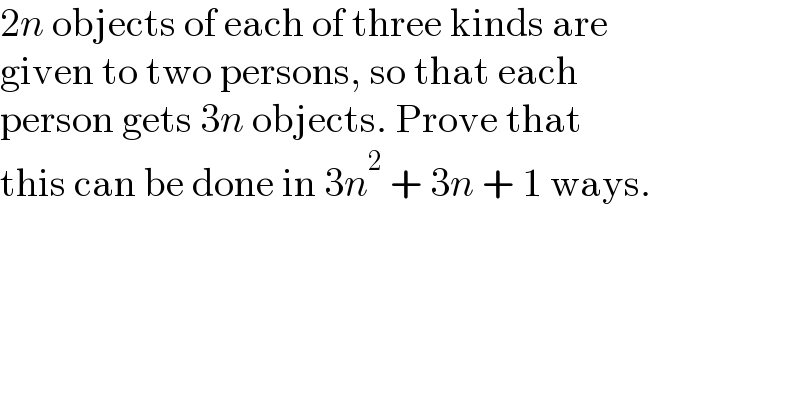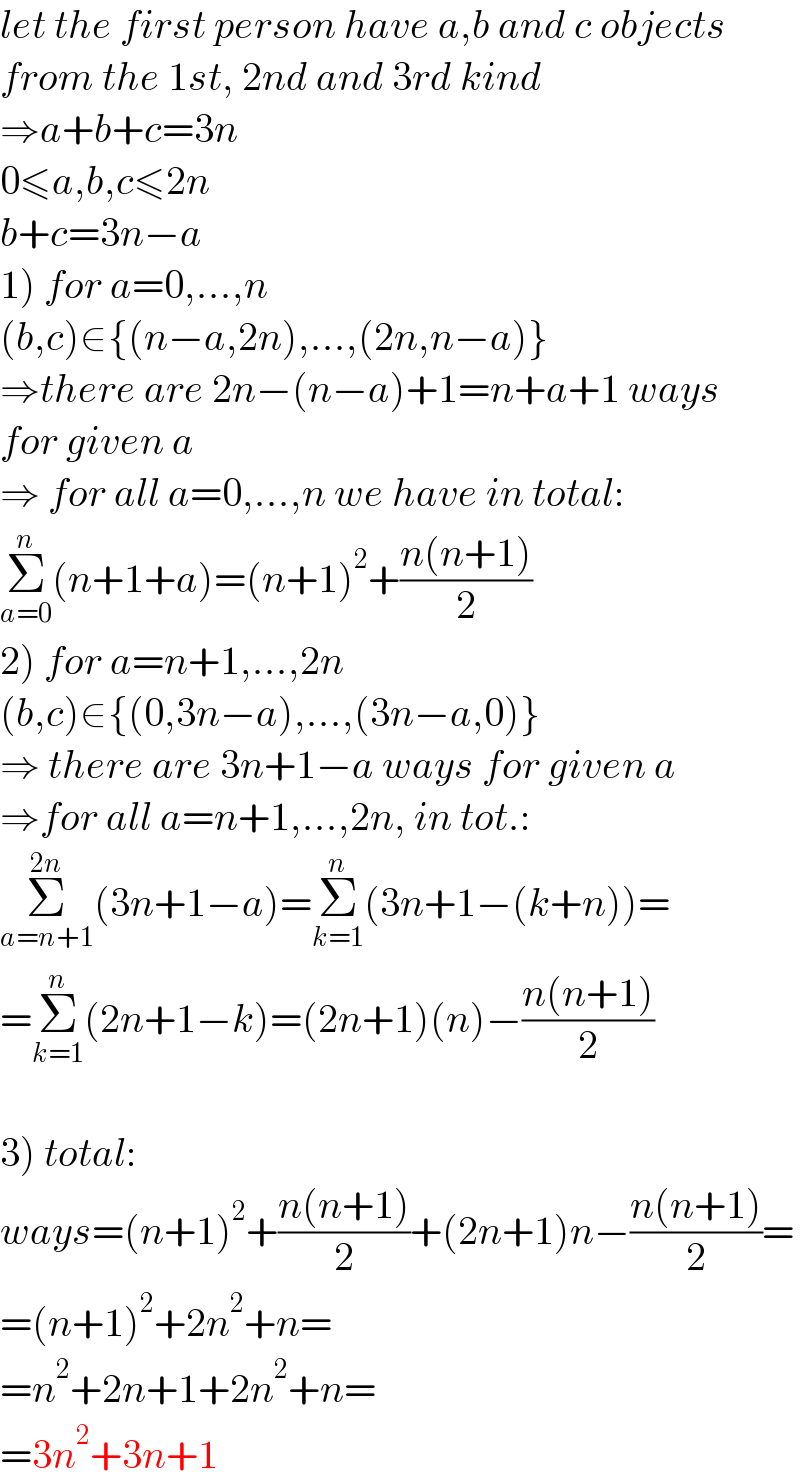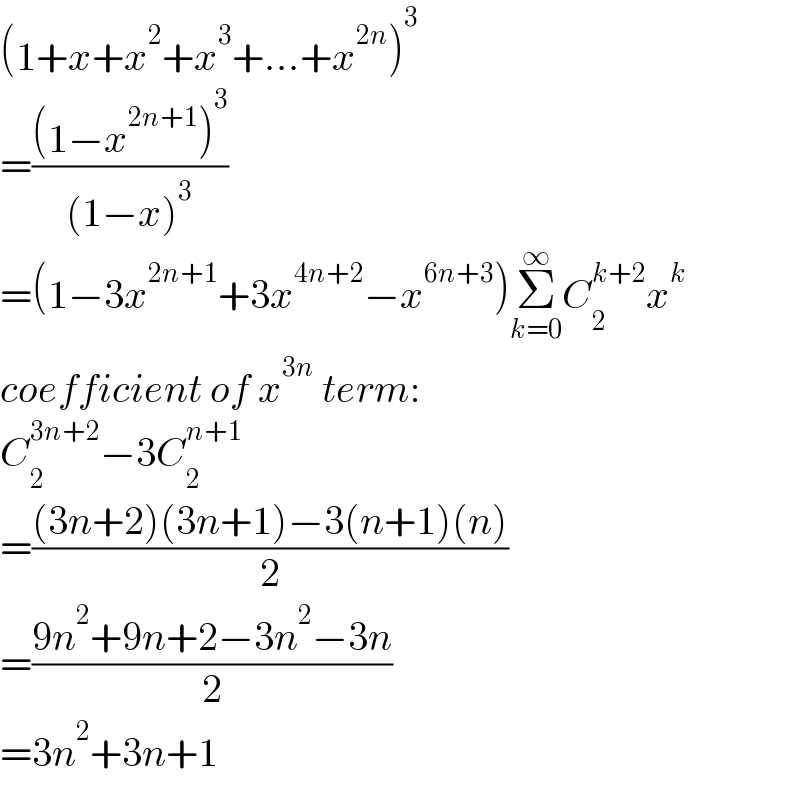
Previous in Permutation and Combination Next in Permutation and Combination
Question Number 170794 by mr W last updated on 30/May/22

$$\mathrm{2}{n}\:\mathrm{objects}\:\mathrm{of}\:\mathrm{each}\:\mathrm{of}\:\mathrm{three}\:\mathrm{kinds}\:\mathrm{are} \\ $$$$\mathrm{given}\:\mathrm{to}\:\mathrm{two}\:\mathrm{persons},\:\mathrm{so}\:\mathrm{that}\:\mathrm{each} \\ $$$$\mathrm{person}\:\mathrm{gets}\:\mathrm{3}{n}\:\mathrm{objects}.\:\mathrm{Prove}\:\mathrm{that} \\ $$$$\mathrm{this}\:\mathrm{can}\:\mathrm{be}\:\mathrm{done}\:\mathrm{in}\:\mathrm{3}{n}^{\mathrm{2}} \:+\:\mathrm{3}{n}\:+\:\mathrm{1}\:\mathrm{ways}. \\ $$
Answered by aleks041103 last updated on 05/Jun/22

$${let}\:{the}\:{first}\:{person}\:{have}\:{a},{b}\:{and}\:{c}\:{objects} \\ $$$${from}\:{the}\:\mathrm{1}{st},\:\mathrm{2}{nd}\:{and}\:\mathrm{3}{rd}\:{kind} \\ $$$$\Rightarrow{a}+{b}+{c}=\mathrm{3}{n} \\ $$$$\mathrm{0}\leqslant{a},{b},{c}\leqslant\mathrm{2}{n} \\ $$$${b}+{c}=\mathrm{3}{n}−{a} \\ $$$$\left.\mathrm{1}\right)\:{for}\:{a}=\mathrm{0},...,{n} \\ $$$$\left({b},{c}\right)\in\left\{\left({n}−{a},\mathrm{2}{n}\right),...,\left(\mathrm{2}{n},{n}−{a}\right)\right\} \\ $$$$\Rightarrow{there}\:{are}\:\mathrm{2}{n}−\left({n}−{a}\right)+\mathrm{1}={n}+{a}+\mathrm{1}\:{ways} \\ $$$${for}\:{given}\:{a} \\ $$$$\Rightarrow\:{for}\:{all}\:{a}=\mathrm{0},...,{n}\:{we}\:{have}\:{in}\:{total}: \\ $$$$\underset{{a}=\mathrm{0}} {\overset{{n}} {\sum}}\left({n}+\mathrm{1}+{a}\right)=\left({n}+\mathrm{1}\right)^{\mathrm{2}} +\frac{{n}\left({n}+\mathrm{1}\right)}{\mathrm{2}} \\ $$$$\left.\mathrm{2}\right)\:{for}\:{a}={n}+\mathrm{1},...,\mathrm{2}{n} \\ $$$$\left({b},{c}\right)\in\left\{\left(\mathrm{0},\mathrm{3}{n}−{a}\right),...,\left(\mathrm{3}{n}−{a},\mathrm{0}\right)\right\} \\ $$$$\Rightarrow\:{there}\:{are}\:\mathrm{3}{n}+\mathrm{1}−{a}\:{ways}\:{for}\:{given}\:{a} \\ $$$$\Rightarrow{for}\:{all}\:{a}={n}+\mathrm{1},...,\mathrm{2}{n},\:{in}\:{tot}.: \\ $$$$\underset{{a}={n}+\mathrm{1}} {\overset{\mathrm{2}{n}} {\sum}}\left(\mathrm{3}{n}+\mathrm{1}−{a}\right)=\underset{{k}=\mathrm{1}} {\overset{{n}} {\sum}}\left(\mathrm{3}{n}+\mathrm{1}−\left({k}+{n}\right)\right)= \\ $$$$=\underset{{k}=\mathrm{1}} {\overset{{n}} {\sum}}\left(\mathrm{2}{n}+\mathrm{1}−{k}\right)=\left(\mathrm{2}{n}+\mathrm{1}\right)\left({n}\right)−\frac{{n}\left({n}+\mathrm{1}\right)}{\mathrm{2}} \\ $$$$ \\ $$$$\left.\mathrm{3}\right)\:{total}: \\ $$$${ways}=\left({n}+\mathrm{1}\right)^{\mathrm{2}} +\frac{{n}\left({n}+\mathrm{1}\right)}{\mathrm{2}}+\left(\mathrm{2}{n}+\mathrm{1}\right){n}−\frac{{n}\left({n}+\mathrm{1}\right)}{\mathrm{2}}= \\ $$$$=\left({n}+\mathrm{1}\right)^{\mathrm{2}} +\mathrm{2}{n}^{\mathrm{2}} +{n}= \\ $$$$={n}^{\mathrm{2}} +\mathrm{2}{n}+\mathrm{1}+\mathrm{2}{n}^{\mathrm{2}} +{n}= \\ $$$$=\mathrm{3}{n}^{\mathrm{2}} +\mathrm{3}{n}+\mathrm{1} \\ $$
Commented by mr W last updated on 05/Jun/22

$${thanks}\:{sir}! \\ $$
Answered by mr W last updated on 06/Jun/22

$$\left(\mathrm{1}+{x}+{x}^{\mathrm{2}} +{x}^{\mathrm{3}} +...+{x}^{\mathrm{2}{n}} \right)^{\mathrm{3}} \\ $$$$=\frac{\left(\mathrm{1}−{x}^{\mathrm{2}{n}+\mathrm{1}} \right)^{\mathrm{3}} }{\left(\mathrm{1}−{x}\right)^{\mathrm{3}} } \\ $$$$=\left(\mathrm{1}−\mathrm{3}{x}^{\mathrm{2}{n}+\mathrm{1}} +\mathrm{3}{x}^{\mathrm{4}{n}+\mathrm{2}} −{x}^{\mathrm{6}{n}+\mathrm{3}} \right)\underset{{k}=\mathrm{0}} {\overset{\infty} {\sum}}{C}_{\mathrm{2}} ^{{k}+\mathrm{2}} {x}^{{k}} \\ $$$${coefficient}\:{of}\:{x}^{\mathrm{3}{n}} \:{term}: \\ $$$${C}_{\mathrm{2}} ^{\mathrm{3}{n}+\mathrm{2}} −\mathrm{3}{C}_{\mathrm{2}} ^{{n}+\mathrm{1}} \\ $$$$=\frac{\left(\mathrm{3}{n}+\mathrm{2}\right)\left(\mathrm{3}{n}+\mathrm{1}\right)−\mathrm{3}\left({n}+\mathrm{1}\right)\left({n}\right)}{\mathrm{2}} \\ $$$$=\frac{\mathrm{9}{n}^{\mathrm{2}} +\mathrm{9}{n}+\mathrm{2}−\mathrm{3}{n}^{\mathrm{2}} −\mathrm{3}{n}}{\mathrm{2}} \\ $$$$=\mathrm{3}{n}^{\mathrm{2}} +\mathrm{3}{n}+\mathrm{1} \\ $$
Commented by aleks041103 last updated on 05/Jun/22

$${This}\:{is}\:{very}\:{clever}!\:{Thank}\:{you}! \\ $$
